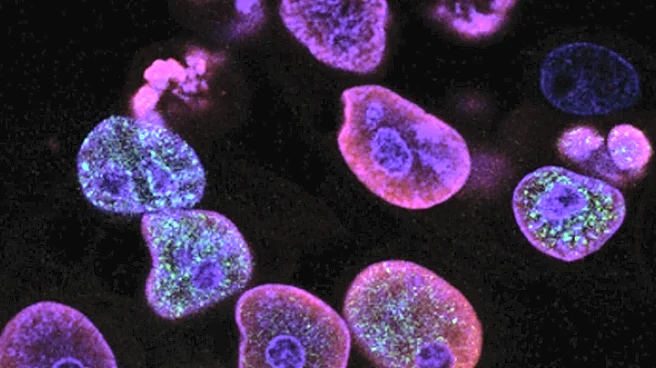What's Happening?
Recent research has identified lobeline as a significant modulator of stress granules (SGs) in glioblastoma (GBM) cells under hypoxic conditions. Lobeline, a compound previously recognized for its effects on SG dynamics, has been shown to delay the dissolution of SGs in both immortalized and primary GBM cells post-hypoxia. This delay is dose-dependent, with higher concentrations of lobeline resulting in a greater number of SGs retained in cells. The study highlights that lobeline does not induce SG formation under normoxic conditions, but significantly impacts SG persistence post-hypoxia, leading to increased cell death. The research suggests that lobeline's modulation of SGs could disrupt GBM paracrine signaling by affecting extracellular vesicle (EV) secretion, offering a potential therapeutic strategy against GBM.
Why It's Important?
The findings are significant as they propose a novel therapeutic approach for treating glioblastoma, a highly aggressive brain cancer with limited treatment options. By modulating SG dynamics, lobeline not only increases cell death in hypoxic conditions but also potentially interferes with the tumor's ability to communicate and spread through EVs. This could lead to the development of new treatments that specifically target the cellular stress responses in cancer cells, potentially improving outcomes for patients with GBM. The study underscores the importance of understanding cellular stress mechanisms and their role in cancer progression, which could have broader implications for cancer research and therapy development.
What's Next?
Further research is needed to explore the full therapeutic potential of lobeline in GBM treatment. Clinical trials could be designed to test the efficacy and safety of lobeline in human patients, focusing on its ability to enhance cell death and disrupt tumor signaling pathways. Additionally, studies could investigate the combination of lobeline with other cancer therapies to assess synergistic effects. Understanding the precise mechanisms by which lobeline affects SG dynamics and EV secretion will be crucial in optimizing its use as a cancer treatment.
Beyond the Headlines
The study also raises questions about the broader implications of targeting stress granules in cancer therapy. As SGs are involved in various cellular stress responses, modulating their dynamics could have effects beyond cancer treatment, potentially impacting other diseases characterized by cellular stress. Ethical considerations regarding the manipulation of cellular stress responses in humans will need to be addressed as this research progresses.









